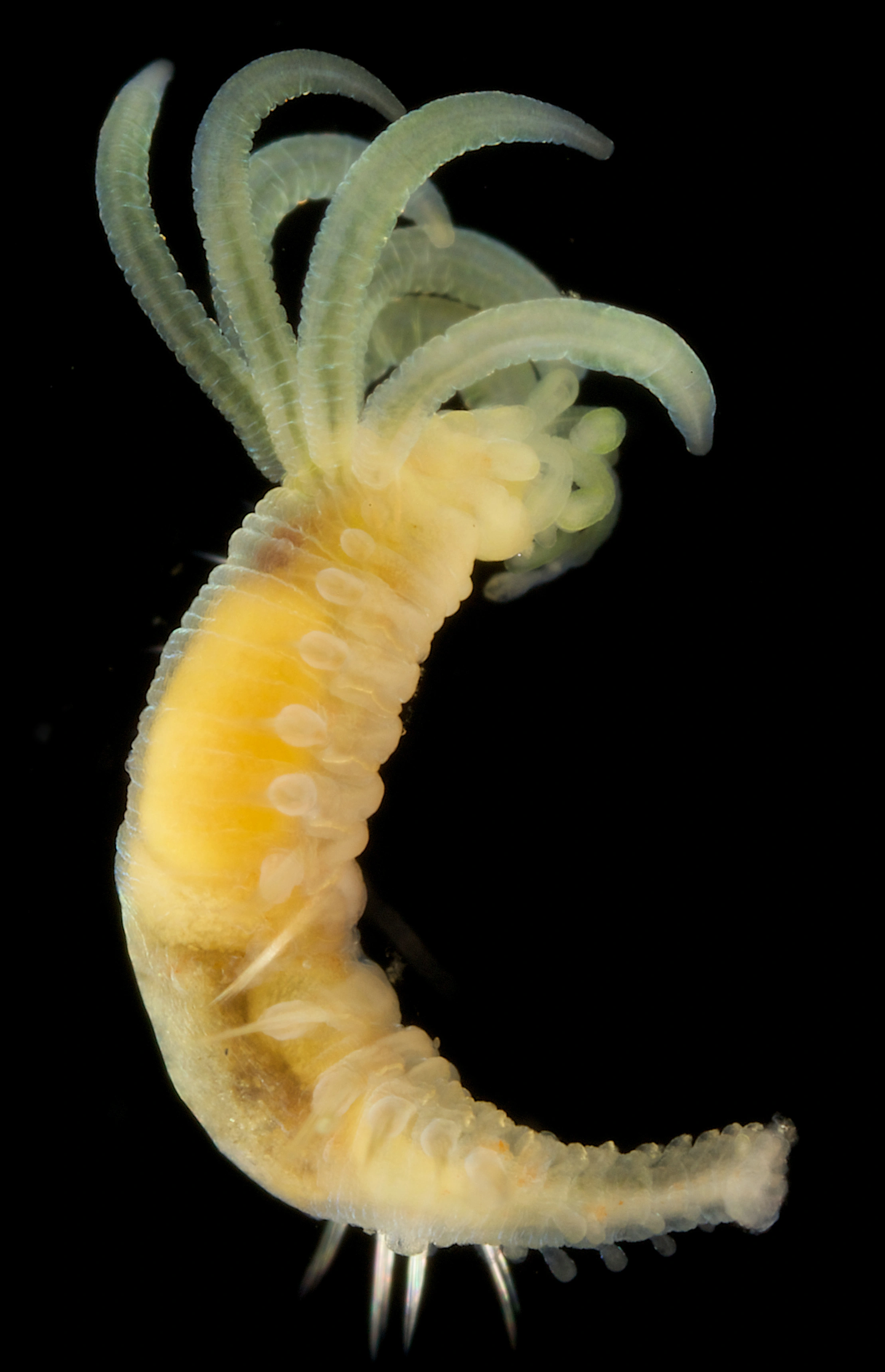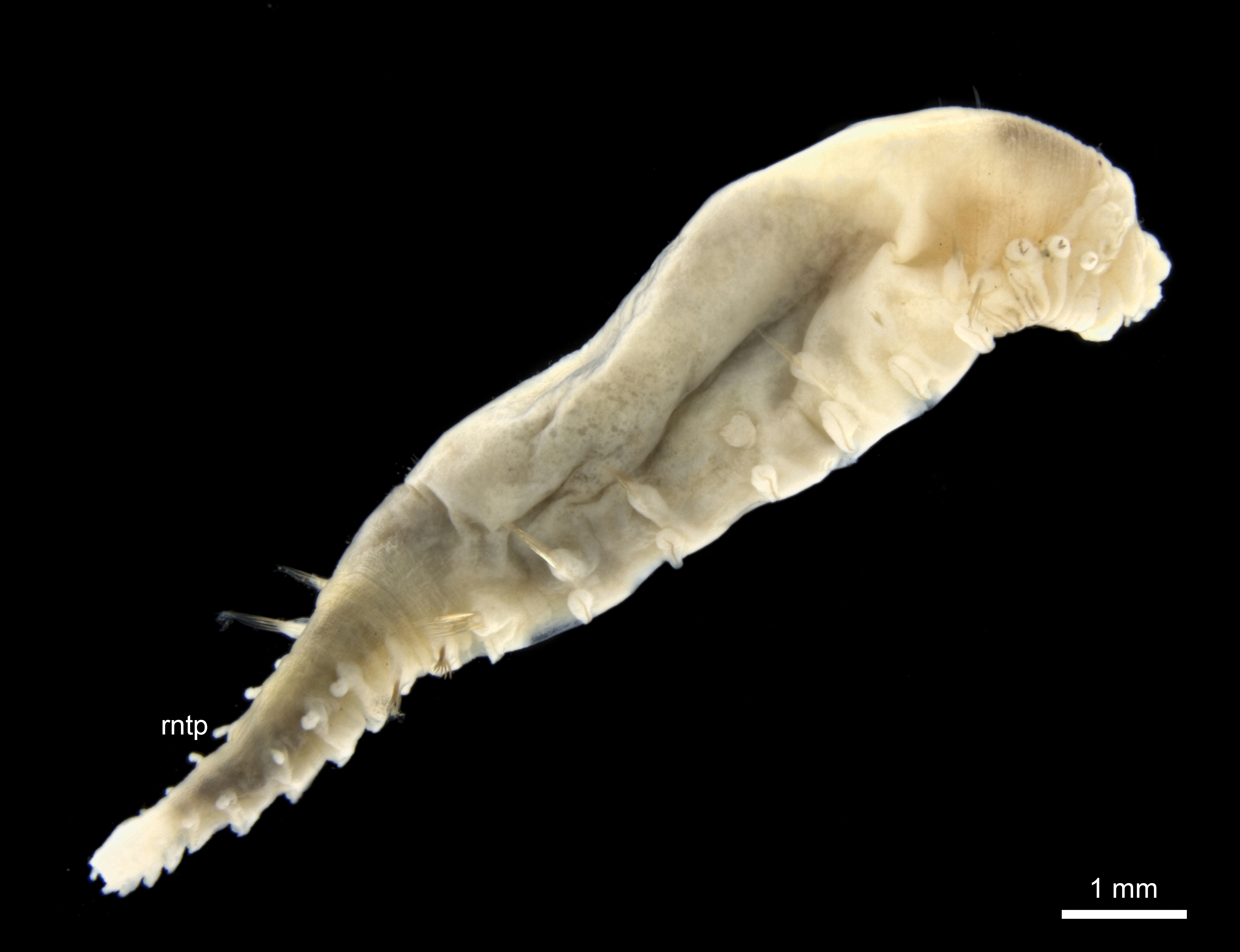Amage auricula
Amage auricula can be up to 12 mm long. It has a characteristic body shape which resembles a maggot. It is ubiquitous in Norwegian waters at depths between about 100 to more than 1000 meters.
Type locality
Koster Islands, Bohuslän, Sweden, 180–220 m
Key characters
Habitus, lateral view
rntp: rudimentary notopodia
Habitus, ventral view
pfh: prostomial frontal horns
rntp: rudimentary notopodia
Measurements: Up to 12 mm long
Number of thoracic chaetigers: 14
Number of thoracic uncinigers: 11
Number of abdominal uncinigers: 8
Prostomium: Trilobed; middle lobe drawn out into horns; eyespots absent
Mouth tentacles: Smooth
Branchiae: Four pairs of comparatively large branchiae in two groups widely separated at mid-dorsum; three branchiae in each group arranged in triangle, fourth branchia located closer to mid-dorsum and obliquely behind the posterior one of the three
Paleae: Absent
Special features: Rudimentary notopodia on all abdominal segments
Pygidium: With one pair of short lateral cirri
Tube: Comprised of thin layer of organic secretion covered with thick layer of mud, often with attached sponge spicules
Distribution
Ubiquitous in Norwegian waters; from about 100 m to more than 1000 m
Similar species
Three additional species of Amage: Amage adspersa (Grube, 1863), Amage gallasii Marion, 1875 and Amage scotica Clark, 1952 are reported from the Clyde Sea, Scotland, but with no confirmed records from Norway. Adult complete specimens of Amage auricula are characteristic, however juveniles or damaged specimens might be confused with the above-mentioned species. Amage adspersa has 17 pairs of thoracic chaetigers compared with 14 pair of thoracic chaetigers in A. auricula. Amage gallasii has three pairs of branchiae compared to four pairs of branchiae in A. auricula. Amage scotica has nine abdominal uncingers compared to eight uncingers in A. auricula.
Sources
Clark RB (1952). New Records of sub-littoral polychaetes from the Clyde Sea area, with a description of a new species. Proceedings of the Royal Society of Edinburgh, Ser. Section B, Biology, 65(1): 1-26.
Grube AE (1863). Beschreibung neuer oder wenig bekannter Anneliden. Sechster Beitrag. Archiv für Naturgeschichte, Berlin 29: 37-69. https://biodiversitylibrary.org/page/7071934
Holthe T (1986a). Polychaeta Terebellomorpha. Marine Invertebrates of Scandinavia 7: 1-192.
Malmgren AJ (1866). Nordiska Hafs-Annulater. [part three of three]. Öfversigt af Königlich Vetenskapsakademiens förhandlingar, Stockholm 22(5): 355-410, plates XVIII-XXIX. https://biodiversitylibrary.org/page/32339631
Marion AF (1875). Sur les Annélides de Marseille. Revue des sciences naturelles, Montpellier. 4(1): 301-312. http://biodiversitylibrary.org/page/14526461
Personal observations, Alvestad T.
Siden siteres som:
Alvestad T og Budaeva N (2020). Amage auricula Malmgren, 1866. www.artsdatabanken.no/Pages/299292. Nedlastet <dag/måned/år>


